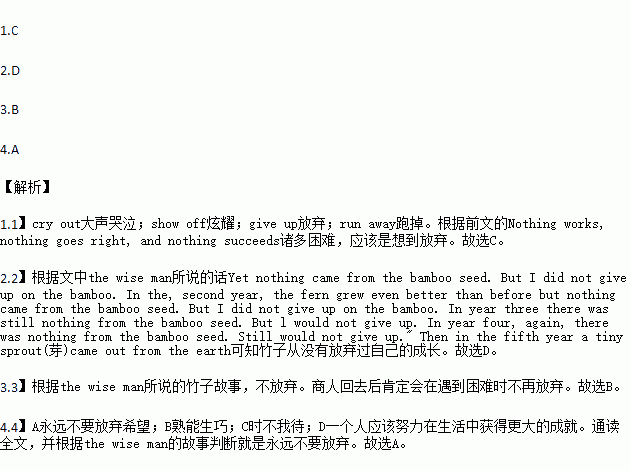题目内容
If you are trying to achieve big goals in your life and work, the chances are that, from time to time, you hit rock bottom. Nothing works, nothing goes right, and nothing succeeds. At times like these, you may feel like throwing in the towel. But before you do, read the following story. It might just change your mind.
One day, a small business owner decided he'd had enough. Enough of the endless work, enough of the lack of response, enough of the disturbing loneliness.
He went into the woods to have one last talk to the wise man. "Mr. wise man," he said. "Can you give me one good reason why I shouldn't give up?"
The answer took him by surprise. "Look around you," the wise man said. "Do you see the fern f蕨类植物)and the bamboo?"
“Yes:' the man replied.
“When I planted the fern and the bamboo, I took very good care of them. I gave them both equal amounts of food and water. I gave them sunlight in spring and protected them from the storms in autumn. The fern quickly grew from the earth. Yet nothing came from the bamboo seed. But I did not give up on the bamboo. In the, second year, the fern grew even better than before but nothing came from the bamboo seed. But I did not give up on the bamboo. In year three there was still nothing from the bamboo seed. But l would not give up. In year four, again, there was nothing from the bamboo seed. Still would not give up."
Then in the fifth year a tiny sprout(芽)came out from the earth. Compared to the fern it was seemingly small. But day by day the sprout grew. Within six months, the sprout had risen to a height of 100 feet. It had spent the five years growing roots. Those roots made it strong and gave it what it needed to survive." "Did you know, young man, that all this time you have been struggling, you have been growing? Grow the roots that you need to produce your fruit."
"Don't compare yourself to others. All things have different purposes, and different journeys. The bamboo has a different purpose from the fern. Yet they both make the forest beautiful. Your time will come. You will rise high."
The small business owner left the forest. And never went back.
If nothing seems like it is happening in your life, despite all the work you're putting in, remember that you're probably growing roots not fruit. Stick with it. One day not far from now, there'll be a great harvest.
1.The underlined phrase "throwing in the towel" in Paragraph l probably means .
A. crying out B. showing off
C. giving up D. running away
2.After the wise man planted the fern and the bamboo,
A. he cared for the fern only
B. they didn't receive any care from him
C. he gave up the bamboo in the fifth year
D. the bamboo seed never stopped growing
3.From the passage we can conclude that the small business owner will
A. not turn to the wise man for help again
B. not give up in face of difficulties
C. give up his business later
D. grow some bamboo later
4.Which of the following best describes the story in the passage?
A. Never give up hope.
B. Practice makes perfect.
C. Time and tide wait for nobody.
D. One should try and achieve bigger goals in life.
 轻巧夺冠周测月考直通中考系列答案
轻巧夺冠周测月考直通中考系列答案
